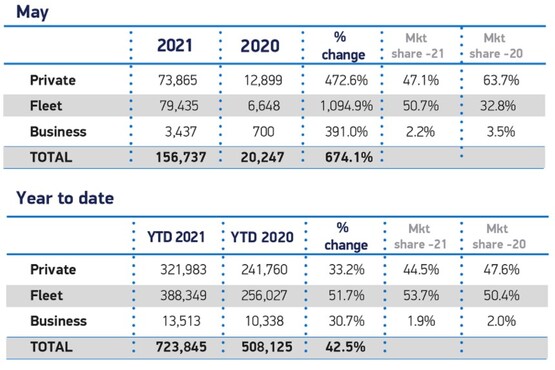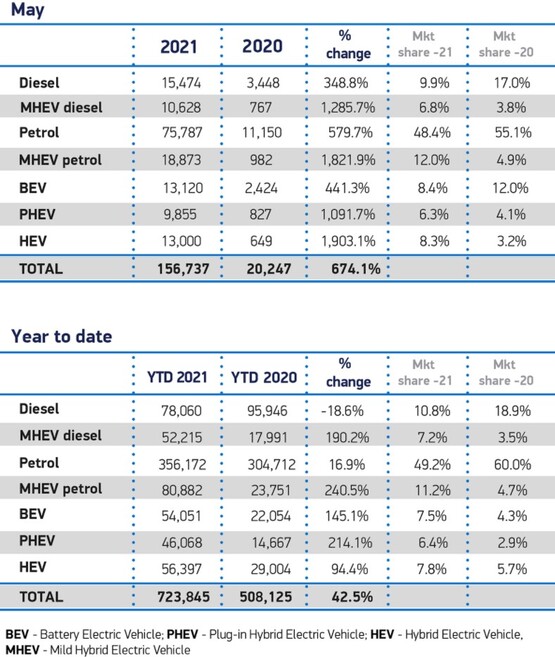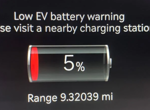May’s new car market finished with 156,737 registrations, 14.7% lower than the last proper May market prior to the pandemic, when 183,724 units were sold in May 2019.
Compared with May 2020, when car showrooms were closed in a widespread COVID-19 lockdown and only 20,000 cars were registered, last month’s market was 674.1% up.
Against a more positive economic backdrop – including OECD forecasting a 7.2% increase in UK GDP during 2021 – fleet registrations grew more than twice as fast as private purchases in May.
Large fleets, including rental and captive, accounted for 50.7% of all new vehicles registered, which the SMMT said demonstrates improving business confidence.
Nevertheless, fleet registrations were 21,000 down on May 2019, whereas private sales were only 5,500 behind.
 As the mid-year point approaches, the SMMT’s data shows that since the start of 2021 the total new car sales remains 29.1% below the 10-year average recorded for the same period, at 296,448 units.
As the mid-year point approaches, the SMMT’s data shows that since the start of 2021 the total new car sales remains 29.1% below the 10-year average recorded for the same period, at 296,448 units.
“With dealerships back open and a brighter, sunnier, economic outlook, May’s registrations are as good as could reasonably be expected,” said Mike Hawes, chief executive of the SMMT.
“Increased business confidence is driving the recovery, something that needs to be maintained and translated in private consumer demand as the economy emerges from pandemic support measures.”
 Hawes reminded the UK Government that a long term strategy for market transition and infrastructure investment is still required if carmakers and dealers are to successfully encourage more consumers into electric cars.
Hawes reminded the UK Government that a long term strategy for market transition and infrastructure investment is still required if carmakers and dealers are to successfully encourage more consumers into electric cars.
Across 2021 to date, plug-in vehicles now comprise 13.8% of new car registrations, up from 7.2% a year earlier, with the most rapid growth seen in plug-in hybrid (PHEV) derivatives.
Sue Robinson, NFDA chief executive, added: “The outlook for the industry remains positive, consumer confidence is rising and with the economy performing better than expected, dealers are optimistic about the months ahead although tightness in supply may affect registrations of new cars over the summer”.
Catherine Faiers, chief operating officer at Auto Trader, said the new car registration statistics were not surprising given the demand and supply dynamics being seen seeing in the market at the moment
Faiers added: "It’s encouraging to see the new car market beginning to return to strength after the challenges for the automotive industry during the various lockdowns. An increase in demand for new cars gives us an important measure of the health of the market overall.
 “The strong demand we’re seeing for cars is reflective of positive consumer sentiment towards car ownership, with almost a third of consumers continuing to tell us owning a car is more important to them than it was before the pandemic, to avoid public transport or provide flexibility.
“The strong demand we’re seeing for cars is reflective of positive consumer sentiment towards car ownership, with almost a third of consumers continuing to tell us owning a car is more important to them than it was before the pandemic, to avoid public transport or provide flexibility.
"In addition, many consumers have more disposable income as a result of saving during the pandemic, making owning a car feel more affordable."
KPMG UK's automotive lead Richard Peberdy believes motorists are re-evaluating what vehicle they require to meet changing commuting habits.
“Despite some caution, there are signs that sales are ripe for recovery in the longer term. The average age of vehicles on our roads is at a record high, suggesting many drivers will be looking to switch soon, and inventory shortages in the used-vehicle market should push motorists towards new models," he said.
The stock shortages being experienced will encourage dealers to preserve margin, he added.



















Login to comment
Comments
No comments have been made yet.